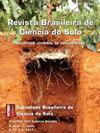Soil physical change and sugarcane stalk yield induced by cover crop and soil tillage
IF 2
4区 农林科学
Q3 SOIL SCIENCE
引用次数: 3
Abstract
Conventional tillage and intensive machinery traffic are the major causes of physical soil degradation in sugarcane fields. This study evaluates the impact of adopting conservation management practices during sugarcane planting on soil physical properties and stalk yield of sugarcane in the municipality of Ibitinga, state of São Paulo, Brazil. The experimental design (split-block) included four cover crops and three soil tillage systems, with three repetitions. For comparison purposes, a control treatment was also included (without cover crop and under conventional tillage). Sampling for soil physical analysis was performed in three layers that coincide with soil horizons A (0.00-0.20 m), AB (0.20-0.30 m), and Bt (0.30-0.70 m), during cane-plant and first sugarcane ratoon cycles. The results showed that cultivation of sunn hemp associated with deep subsoiling induced high stalk yield of sugarcane in both production cycles, cane plant (116 Mg ha) and first ratoon (114 Mg ha), with a net gain of 11 and 9 Mg ha compared with the control treatment, respectively. However, these results were not sufficient to induce significant differences in sugarcane yield. Nonetheless, the use of sunn hemp and millet, associated with subsoiling (at 0.40 or 0.70 m depth) during sugarcane planting, are promising management strategies to sustain better soil’s physical quality when compared to traditional management, conventional soil tillage without cover crops and/or cash crop, as peanuts, that increase the risks of soil compaction and physical degradation.覆盖作物与土壤耕作对土壤物理变化与甘蔗秸秆产量的影响
常规耕作和密集的机械交通是甘蔗田土壤物理退化的主要原因。本研究评估了在巴西圣保罗州伊比廷加市甘蔗种植期间采用保护管理措施对土壤物理性质和甘蔗秸秆产量的影响。试验设计(分块)包括四种覆盖作物和三种土壤耕作系统,重复三次。为了进行比较,还包括一个对照处理(不种植覆盖作物和采用常规耕作)。在甘蔗种植和甘蔗第一个再生周期期间,在土壤层A (0.00-0.20 m)、AB (0.20-0.30 m)和Bt (0.30-0.70 m)的三个层进行土壤物理分析取样。结果表明,在甘蔗株(116 Mg ha)和第一代(114 Mg ha)两个生产周期中,与对照处理相比,晒麻与深埋处理的甘蔗茎秆产量均较高,净增产分别为11 Mg ha和9 Mg ha。然而,这些结果不足以引起甘蔗产量的显著差异。尽管如此,与传统管理、传统土壤耕作(不种植覆盖作物和/或经济作物,如花生)相比,在甘蔗种植期间使用大麻和谷子并进行深埋(深度为0.40或0.70米)是有希望保持更好土壤物理质量的管理策略,后者增加了土壤板结和物理退化的风险。
本文章由计算机程序翻译,如有差异,请以英文原文为准。
求助全文
约1分钟内获得全文
求助全文
来源期刊

Revista Brasileira De Ciencia Do Solo
农林科学-土壤科学
CiteScore
3.00
自引率
11.80%
发文量
32
审稿时长
9-24 weeks
期刊介绍:
The Revista Brasileira de Ciência do Solo is a scientific journal published by the Brazilian Society for Soil Science (SBCS), founded in 1947, and is responsible for the propagation of original and inedited technical-scientific work of interest for Soil Science.
Contributions must not have been previously published or submit to other periodicals, with the only exception of articles presented in summarized form at professional meetings. Literature reviews are accepted when solicited by the Editorial Board.
 求助内容:
求助内容: 应助结果提醒方式:
应助结果提醒方式:


